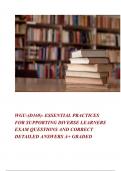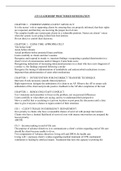K
C
LO
YC
D
U
ST
WGU-(D169)- ESSENTIAL PRACTICES
FOR SUPPORTING DIVERSE LEARNERS
EXAM QUESTIONS AND CORRECT
DETAILED ANSWERS A+ GRADED
,Every Student Succeeds Act (ESSA) - ANS In 2015, this law became the primary governing
for school funding, operations, and accountability.
Title III Section of ESSA - ANS Requires states to use standardize practice to identify
students in need of English language instruction support, including assessment in reading,
writing, listening, and speaking.
Federal Governing Agency - ANS A governing body regarding public school education that
makes the laws and regulations and has an impact on state policies.
K
State Education Agency (SEA) - ANS A governing body that must follow or be in compliance
with the federal laws and regulations, enact the laws, and monitor implementation.
C
Local Education Agency (LEA) - ANS A governing body that must follow their states laws and
regulations. Places such as public schools and public charter districts.
LO
Home Language Survey - ANS Is a questionnaire given to parents or guardians that helps
schools and Local Education Agencies identify which students are potential English learners
and who will require assessment of the English language proficiency to determine whether they
are eligible for language assistance services.
YC
Bilingual Education Act of 1967 (BEA) - ANS An act that was designed to address dismal
performance and high dropout rates caused by English only policies following a decade of
anti-foreign sentiment throughout the US.
Under this Act, grants were authorized to distribute funds directly to school district so that they
could invest in greater resources, training, and development to teach language minority
D
students English.
English as a Second Language (ESL) or English Language Development (ELD) - ANS
U
Program of techniques, methodology, and special curriculum designed to teach ELs students
explicitly about the English language, including the academic vocabulary needed to access
content instructions, and to develop their English language proficiency in all four language
ST
domains (speaking, listening, reading, and writing).
Language(s) used for instruction: English with little use of the Els primary language(s).
Structured English Immersion (SEI) - ANS Program designed to impart English language
skills so that the Els can transition and succeed in an English-only classroom once proficient.
Language(s) used for instruction: English with little use of the Els primary language(s).
Transitional Bilingual Education (TBE) or Early-Exit Bilingual Education - ANS Program that
maintains and develops skills in the primary language while introducing, maintaining, and
,developing skills in English. The primary purpose of a TBE program is to facilitate the ELs
transition to an all-English instructional program, while students receive academic subject
instruction in the primary language to the extent necessary.
Language(s) used for instruction: Students primary language and English.
Dual Language or Two-Way Immersion - ANS Bilingual program where the goal is for the
students to develop language proficiency in two languages by receiving instruction on English
and another another language in a classroom that is usually comprised of half primary-English
speakers and half primary speakers of the other language.
K
Language(s) used for instruction: English and another language.
C
Individualized Education Plan or Program (IEP) - ANS A written document, developed at a
meeting of the (What is the term?) team, that describes specialized instruction and related
services to address the student's needs that result from the student's disability. Indicates exactly
LO
how the child will receive individualized services and supports provided at school.
World-Class Instructional Design and Assessment (WIDA) - ANS Is a partnership of 40 states
that developed standards and assessments for English learners.
YC
WIDA Standards Framework - ANS Describes conceptualization of language learning in
addition to the nature of academic language and its relation to language development.
WIDA Can Do Philosophy - ANS Is based on the belief that all students bring to their learning
cultural, experiential, and linguistic practices, skills, and ways of knowing from their homes and
communities.
D
Guiding Principles of Language Development - ANS Represents WIDA's core beliefs about
language development they are derived from a synthesis of literature and research related to
U
language development and effective instructional practices for language learners.
Features of Academic Language in Sociocultural Contexts - ANS Highlights academic
ST
language features across three dimensions: discourse, sentence, and word/phrase and six
levels of language proficiency taking into consideration the various components of the learning
environment (Grade level content, purposes for language use, role relationships with others,
and other factors).
Performance Definitions - ANS Describes the criteria of receptive language (listening and
reading) and productive Language (speaking and writing) at six levels of language proficiency.
Can Do Descriptors - ANS Illustrates what learners can do at each level of language
proficiency across the five language development standards.
, Standard Matrices - ANS Helps educators envision what language development might look
like in K - 12 classrooms across levels of language proficiency for each of the five standards.
Transition Plan (IEP) - ANS When a student reaches the age of 16 their IEP must include a
(What is the term?) that will help them prepare for life after high school.
S-M-A-R-T Goals - ANS Goals that are: The Best IEP goals.
•Specific
•Measurable
K
•Attainable
•Results-Oriented
•Time-Bound
C
Least Restrictive Environment (LRE) - ANS Means kids who get special education should be
in the same classrooms as other kids as much as possible.
LO
The IDEA requires schools to teach students in a (What is the term?)
Mainstreaming Classroom - ANS Is a general education classroom- kids with an IEP are
integrated into the general education classroom for some or most of the day. They may also
have some instruction in a separate, special education classroom.
YC
Inclusion Classroom - ANS Formerly referred to as a mainstreaming classroom. Is a general
education classroom that has some students who receive special education.
Change in Placement (Disciplinary) - ANS When a child is removed from school, which
prevents the child from receiving services.
D
The removal from the program for more than 10 consecutive days, a series of removals that
constitute a pattern or exceeds 10 cumulative school days, or removal from a program to an
U
interim and alternative educational setting.
Manifestation (Determination Review)-(MDR) - ANS When a child's misbehavior is caused by
ST
a disability, like a learning or thinking difference.
The purpose is to determine whether the offending behavior was a manifestation of the students
disability or due to failure to implement the students program.
(MDR) Committee - ANS The committee for manifestation determination review that is
intended to be an interdisciplinary committee.
Interdisciplinary Practice - ANS A practice that is conducted by a group of individuals who
integrate methods, data, and concepts from at least two fields in order to develop theories or
solutions that are beyond the confines of one discipline.





